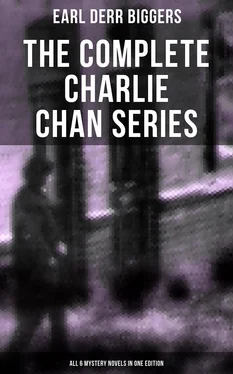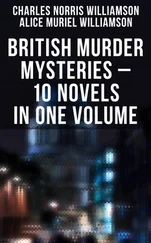"Not Tait's," she answered. "I've just come from there."
"What! I thought you motored in from Burlingame?"
"So I did—at five. I've traveled a bit since then. How about some chop-suey for this Boston boy?"
Good lord, John Quincy thought. Was there anything in the world he wanted less? No matter. Barbara took him among the Chinese.
He didn't give a hang about the Chinese. Nor the Mexicans, whose restaurants interested the girl next. At the moment, he was unsympathetic toward Italy. And even toward France. But he struggled on the international round, affronting his digestion with queer dishes, and dancing thousands of miles with the slim Barbara in his arms. After scrambled eggs at a place called Pete's Fashion, she consented to call it an evening.
As John Quincy staggered into Roger's house, the great clock in the hall was striking three. The girl was still alert and sparkling. John Quincy hastily concealed a yawn.
"All wrong to come home so early," she cried. "But we'll have a dance or two on the boat. By the way, I've been wanting to ask. What does it mean? The injured cheek?"
"Why—er—I—" John Quincy remarked. Over the girl's shoulder he saw Roger violently shaking his head. "Oh, that," said John Quincy, lightly touching the wound. "That's where the West begins. Good night. I've had a bully time." And at last he got up-stairs.
He stood for a moment at his bedroom window, gazing down at the torchlight procession of the streets through this amazing city. He was a little dazed. That soft warm presence close by his side in the car—pleasant, very pleasant. Remarkable girls out here. Different!
Beyond shone the harbor lights. That other girl—wonderful eyes she had. Just because she had laughed at him his treasured hat box floated now forlorn on those dark waters. He yawned again. Better be careful. Mustn't be so easily influenced. No telling where it would end.
Chapter IV. A Friend of Tim's
Table of Contents
It was another of those mornings on which the fog maybe did not come. Roger and his guests were in the limousine again; it seemed to John Quincy that they had left it only a few minutes before. So it must have seemed to the chauffeur too as, sleepy-eyed, he hurried them toward the water-front.
"By the way, John Quincy," Roger said, "you'll want to change your money before you go aboard."
John Quincy gathered his wandering thoughts. "Oh, yes, of course," he answered.
Roger smiled. "Just what sort of money would you like to change it for?" he inquired.
"Why—" began John Quincy. He stopped. "Why, I always thought—"
"Don't pay any attention to Roger," Barbara laughed. "He's spoofing you." She was fresh and blooming, a little matter like three A. M. made no difference to her. "Only about one person out of a thousand in this country knows that Hawaii is a part of the United States, and the fact annoys us deeply over in the Islands. Dear old Roger was trying to get you in wrong with me by enrolling you among the nine hundred and ninety-nine."
"Almost did it, too," chuckled Roger.
"Nonsense," said Barbara. "John Quincy is too intelligent. He's not like that congressman who wrote a letter to 'the American Consul at Honolulu.'"
"Did one of them do that?" smiled John Quincy.
"He certainly did. We almost gave up the struggle after that. Then there was the senator who came out on a junket, and began a speech with: 'When I get home to my country—' Some one in the audience shouted: 'You're there now, you big stiff!' It wasn't elegant, of course, but it expressed our feeling perfectly. Oh, we're touchy, John Quincy."
"Don't blame you a bit," he told her. "I'll be very careful what I say."
They had reached the Embarcadero, and the car halted before one of the piers. The chauffeur descended and began to gather up the baggage. Roger and John Quincy took a share of it, and they traversed the pier-shed to the gangplank.
"Get along to your office, Roger," Barbara said.
"No hurry," he answered. "I'll go aboard with you, of course."
Amid the confusion of the deck, a party of girls swept down on Barbara, pretty lively girls of the California brand. John Quincy learned with some regret that they were there only to see Barbara off. A big broad-shouldered man in white pushed his way through the crowd.
"Hello there!" he called to Barbara.
"Hello, Harry," she answered. "You, know Roger, don't you? John Quincy, this is an old friend of mine, Harry Jennison."
Mr. Jennison was extremely good-looking, his face was deeply tanned by the Island sun, his hair blond and wavy, his gray eyes amused and cynical. Altogether, he was the type of man women look at twice and never forget; John Quincy felt himself at once supplanted in the eyes of Barbara's friends.
Jennison seized the boy's hand in a firm grip. "Sailing too, Mr. Winterslip?" he inquired. "That's good. Between us we ought to be able to keep this young woman entertained."
The shore call sounded, and the confusion increased. Along the deck came a little old lady, followed by a Chinese woman servant. They walked briskly, and the crowd gave way before them.
"Hello—this is luck," cried Roger. "Madame Maynard—just a moment. I want you to meet a cousin of mine from Boston." He introduced John Quincy. "I give him into your charge. Couldn't find a better guide, philosopher and friend for him if I combed the Islands."
The old lady glanced at John Quincy. Her black eyes snapped. "Another Winterslip, eh?" she said. "Hawaii's all cluttered up with 'em now. Well, the more the merrier. I know your aunt."
"Stick close to her, John Quincy," Roger admonished.
She shook her head. "I'm a million years old," she protested. "The boys don't stick so close any more. They like 'em younger. However, I'll keep my eye on him. My good eye. Well, Roger, run over some time." And she moved away.
"A grand soul," said Roger, smiling after her. "You'll like her. Old missionary family, and her word's law over there."
"Who's this Jennison?" asked John Quincy.
"Him?" Roger glanced over to where Mr. Jennison stood, the center of an admiring feminine group. "Oh, he's Dan's lawyer. One of the leading citizens of Honolulu, I believe. John J. Adonis himself, isn't he?" An officer appeared, herding the reluctant throng toward the gangplank. "I'll have to leave you, John Quincy. A pleasant journey. When you come through on your way home, give me a few more days to try to convince you on my San Francisco offer."
John Quincy laughed. "You've been mighty kind."
"Not at all." Roger shook his hand warmly. "Take care of yourself over there. Hawaii's a little too much like Heaven to be altogether safe. So long, my boy, so long."
He moved away. John Quincy saw him kiss Barbara affectionately and with her friends join the slow procession ashore.
The young man from Boston stepped to the rail. Several hundred voices were calling admonitions, promises, farewells. With that holiday spirit so alien to John Quincy's experience, those ashore were throwing confetti. The streamers grew in number, making a tangle of color, a last frail bond with the land. The gangplank was taken up, clumsily the President Tyler began to draw away from the pier. On the topmost deck a band was playing— Aloha-oe , the sweetest, most melancholy song of good-by ever written. John Quincy was amazed to feel a lump rising in his throat.
The frail, gay-colored bond was breaking now. A thin veined hand at John Quincy's side waved a handkerchief. He turned to find Mrs. Maynard. There were tears on her cheeks.
"Silly old woman," she said. "Sailed away from this town a hundred and twenty-eight times. Actual count—I keep a diary. Cried every time. What about? I don't know."
The ship was well out in the harbor now. Barbara came along, Jennison trailing her. The girl's eyes were wet.
Читать дальше












